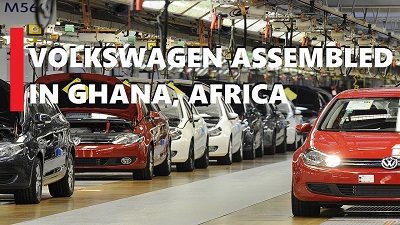Certification of locally assembled vehicles

The story of two friends who stayed in the same village called “Papaasa” somewhere in the Eastern Region were close to each other until in their early 20s when one of them decided to move away from the other because of the lazy behaviour put up by the other friend.
The lazy person known as “Atadwe” was so lazy that washing his own clothes to make him look neat was a big problem for him. The other friend known as “Din Pa Na Eye” stayed away from this lazy friend and was able to invest in his own business to become independent of any other person in the village. This was a positive behaviour worthy of emulation.
Not long ago, the President of the Republic Nana Addo Dankwa Akufo-Addo hinted of plans to set up an automobile industry in Ghana to allow the building of local assembled vehicles in the country to reduce dependency on countries that manufacture such vehicles for export.
AUTOMOBILE POLICY
The decision of the government to set up an automobile industry in the country is a well thought-through policy that will ultimately benefit the country in a number of ways. The automobile policy requires the Ghana Standards Authority (GSA) to play a useful role and ensure that automobiles will be manufactured for both the domestic and the sub-region of West Africa.
In fact, the GSA is required to implement internationally recognised standards and regulations for automobile manufacturing. The implementation of the standards includes compulsory vehicle standards, homologation (vehicle certification), conformity assessment as well as entire vehicle marking to ensure the safety, efficiency and environmental compliance of Ghana’s vehicle fleet. This is an encouraging development because standards and regulations help to facilitate Asset-backed Vehicle Financing thereby enabling the manufacture of the value of the vehicle fleet.
The implementation of these national standards was originally meant to begin in January 2020. Unfortunately, it was delayed due to a slowing down in the ratification of the Customs Amendment Bill. The delay in the ratification of that Bill slowed down the implementation process.
The Bill was eventually passed by Parliament in March 2020, but the country’s determination to move at a faster rate on the issue was once again delayed by the COVID-19 pandemic. The good news is that despite these challenges, in June 2020, the GSA was able to begin its activities in vehicle standardisation to ensure the quality and safety of the first vehicles that were assembled in the country.
All these go to show that the country, with determination, has the capacity to strive shoulder to shoulder with others in the world. Having developed the standards, the GSA is now in a position to certify vehicles that are manufactured elsewhere, within the country or assembled in Ghana.
STANDARDISATION & CERTIFICATION
The standardisation and also certification of the automobile industry in the country is a good move that have been initiated by the government. A number of reasons could be identified as motives behind the move. In the first place, the President thought it wise to indigenise the automobile industry. This way, appropriate skills and technology could be passed on to Ghanaians employed in that sector.
There is also another reason the President thought of a local automobile industry in Ghana. The issue of employment is relevant here because, technical skills employed in that sector could be utilised to form the basis of employment in the sector. Again, world-trained people with marketing skills can also make use of their knowledge to help promote and sell the vehicles manufactured or assembled in Ghana. These will help to reduce unemployment in the country.
Another important reason for the President’s decision relates to attracting attention to Ghana as a hub for the production of vehicles in the sub-region of West Africa. This move is also likely to influence neighbouring states in West Africa and the rest of Africa to place their orders of vehicles from Ghana.
WORKING GROUP TECHNICAL SESSION
In line with the desire to set up an automobile industry in the country, a Working Group Technical Session (WGTS) was set up to see to the review of standards within a certain period. This working group began the review and revision of 15 automobile lubricant national standards. In addition, the group developed also Working Drafts. All these were done in the month of May 2021.
In fact, by the end of May 2021, the Standards Authority had been able to complete the homologation or certification of 14 automobile vehicle models either imported into the country as Fully-Built-Units (FBU) or assembled in Ghana from Semi-Knocked Down Kits.
A number of models were assembled here. Indeed, Homologated Models that were dealt with included VW’s Tiguan, Amarok and Teramont. Others were Gol, Polo, Passat and T-cross, Toyota’s Hilux, Corolla cross, Fortuner and Rav 4. The rest of the Homologated Models dealt with were Land Cruiser Prado, Isuzu’s D-max Pick-up and Changan’s Hunter Pick-up.
As of now the Authority is working on the homologation of an additional 14 models from Ford, Hyundai, Honda, Changan, Citroen, Peugeot and VW.
The homologation of the vehicles is meant to achieve quality and safety by ensuring that all the models are produced according to required standards. The certification or homologation of the models is meant to ensure that the models are fit-for-purpose and ensure value for money for customers who may be interested in purchasing them.
GHANA BEYOND AID
It is quite good that the Ghanaian society has foreseen the need to promote the assembling or production of vehicles in the country. This is in line with Nana Akufo-Addo’s decision of Ghana Beyond Aid which is an economic strategy aimed at ensuring that the country moves on gradually to ultimately depend on its own self in the production of certain goods and services.
With this development, the cash base of the economy will expand to include incomes from purchases made by customers outside the country for such vehicles. What this means is that it will help in the strengthening of the local currency, that is, the Cedi against other currencies.
The establishment of a successful automobile industry greatly depends on ensuring that measures are taken to conform to standards. In this case, the application of standards has come in form of homologation or certification of the models for the purpose of safety, quality as well as fit-for-purpose. This shows that the Ghana Standards Authority is playing its part to ensure that the expected quality is guaranteed.
Once this is done, the vehicles produced here would be comparable in terms of quality to others produced in any part of the world. Indeed, it has been learnt that because of the absence of automobile industry in the country, some of the brand vehicles manufactured and imported into the country had doors and other parts that were sub-standard. What all this means is that Ghana is gradually rubbing shoulder to shoulder with other vehicle manufacturing countries in the world.
This is a bold step that must be greatly supported by all stakeholders because if for nothing at all it shows the determination of the Ghanaian leader, Nana Akufo-Addo, to ensure that the country is pushed to greater heights. Again, as a result of this, Ghana will be accorded the needed respect as far as vehicle production or assembling is concerned.
No country is an island so each one needs to depend on the other for development. However, countries must know the limit of dependence and note that their dependence on others should not be pursued in perpetuity but used as a stepping-stone to leap forward to achieve a reasonable measure of economic independence. This is what President Akufo-Addo is striving to achieve to enable the country to depend on its own self in terms of national economic development in the automobile manufacturing sector. It shows that the government is making every effort “to fix Ghana”.
This is good news that must be told to the rest of the world because it is better than going round the world with a cup in hand “begging for alms”.
Contact email/whatsApp of author:
Pradmat2013@gmail.com (0553318911)














